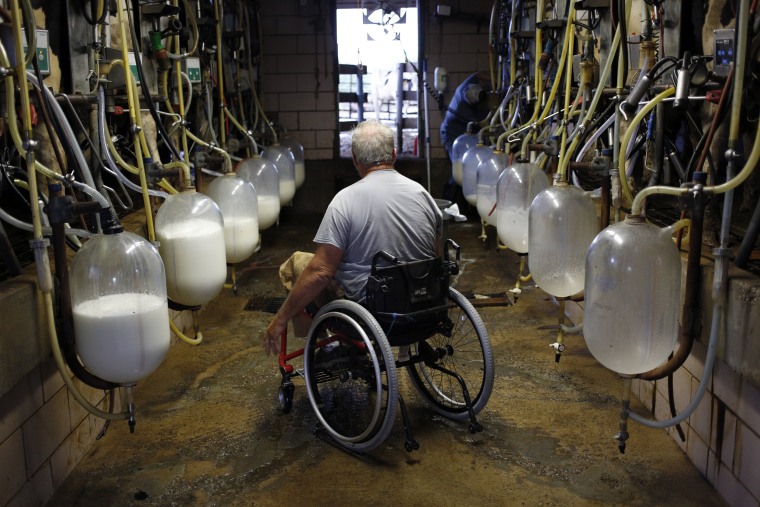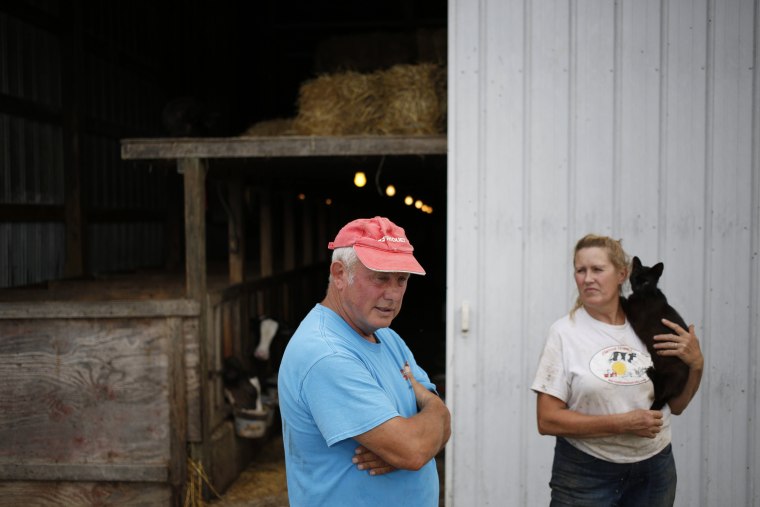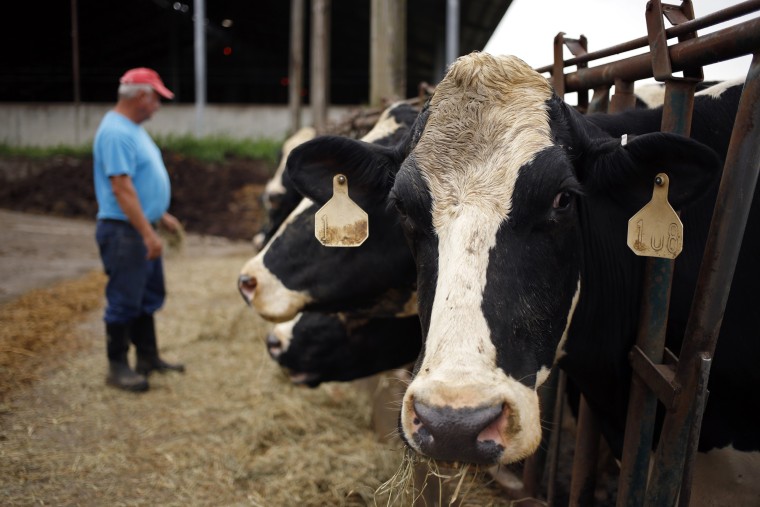
Small-dairy farmers are getting squeezed out by corporate agriculture. “That is not what America is about,” a struggling farmer said.
It’s not just farm families who are affected. Many of the half-dozen farmers NBC News interviewed in Kentucky pointed out that their dairy operations contribute to the local economy, from the farm equipment and feed they buy to the veterinary bills they pay. A two-year Pew Commission report found that small farms made almost 95 percent of their farm-based purchases locally, and a 2016 University of California Davis study concluded that those dollars have twice the impact locally as larger farms.
The closure of farms eliminates jobs in adjacent industries, such as manufacturing, and reduces the population of already struggling areas, said Stephenson, the dairy economist.
Things are about to get worse. Dean Foods announced last week that it would close another milk processing plant, in northern Minnesota, affecting about 50 employees and an unknown number of farmers. And the company’s management recently said it plans to close seven more plants across the country, according to John Stovall, the union president of Teamsters Local 738, which represents the employees at the closing Dean Foods plant in Louisville.
Dean Foods did not respond to requests for comment.
Walmart said it announced plans to open the Indiana plant in 2016, so the Louisville closure should not have come as a surprise. The Indiana plant opened on June 13 and provides about 300 jobs, according to Walmart. The company plans to work with 30 local farmers and supply milk to 500 stores in Indiana, Illinois, Ohio, Michigan and Kentucky.
Molly Blakeman, a spokeswoman for Walmart, said she was unsure of the size of the 30 farms that would replace the more than 100 farms that supplied Dean Foods. Walmart’s goal was to get its Great Value brand closer to local dairies, she said.
“We’re hoping to find efficiencies that will find great cost savings for our customers,” she said. “That’s what Walmart is great at.”

Growing depression over a bleak future
Bob Klingenfus, 69, who has milked cows for 54 years not far from the Coombs family, said friends, family and even the guy who sells him cattle feed have called to check up on him since he lost his contract with Dean Foods because they’re worried he might be depressed.
Klingenfus knows why they’re calling. Some dairy cooperatives have started to send suicide hotline numbers along with the farmers’ checks for milk. Agri-Mark Inc., a dairy cooperative in the Northeast with about 1,000 members, started sending the numbers in January after a third member died of suicide in as many years.
A recent Centers for Disease Control and Prevention report found that from 2005 to 2015, suicide rates grew by 30 percent in half of rural counties, a larger increase than in urban areas. It’s an issue that the House and Senate are trying to address in the Farm Bill by introducing the Farm and Ranch Stress Assistance Network, which would offer mental health resources.
Farmers who lose their business often go through stages of grief that some describe as similar to losing a close family member, said Michael Rosmann, a clinical psychologist and Iowa farmer who has counseled dairy farmers.

“Often they are never the same,” Rosmann said. After losing their farm, many “carry guilt and blame around with them that maybe they didn’t do enough when actually they probably put their whole minds and bodies into salvaging the farm operation. Too many factors are beyond their control.”
In Kentucky, Klingenfus is largely able to hold himself together, until he thinks of the four employees who have lived on his land and worked for him for decades. He knows he can’t afford them once he quits milking in the next couple of weeks, but the thought of having to let them go has him clutching his wife’s hand.
“They don’t want to leave,” Klingenfus said, stopping to clear his throat as tears collected at the corners of his eyes. “They can make more money right now, but this is where they want to be.”
Klingenfus tried to diversify by creating a side agri-tourism business and building a small cheese processing plant, but he doesn’t think he can break even without his Dean Foods contract.
Not many can.

After selling their dairy cows, the Coombses are focusing on growing hay and thinking about raising cattle for beef. They have to pay their farm loan in January, so their stress is only growing. More than anything, they want their two boys to understand and love the life of the dairy farmer.
Alexander, 3, keeps asking where the cows have gone and offering to go find them for his father. That brings Coombs and his wife to tears and makes them talk about ways to bring the cows back. Carilynn often throws out ideas, suggesting they open an ice cream shop, sell dairy-based soap or market their milk to the local community — but it seems all but certain that the boys won’t become the fourth generation to milk cows on this farm.
“What’s happened to us isn’t because we did anything wrong,” Coombs said. “It’s not like we had bad quality milk or treated our cows wrong. It’s just the dairy industry went through circumstances [and] we were the casualties.”
“Maybe we’ll be casualties of the battle,” he said, “but I don’t know if there’s any chance the war can be won.”
Source: nbcnews.com









